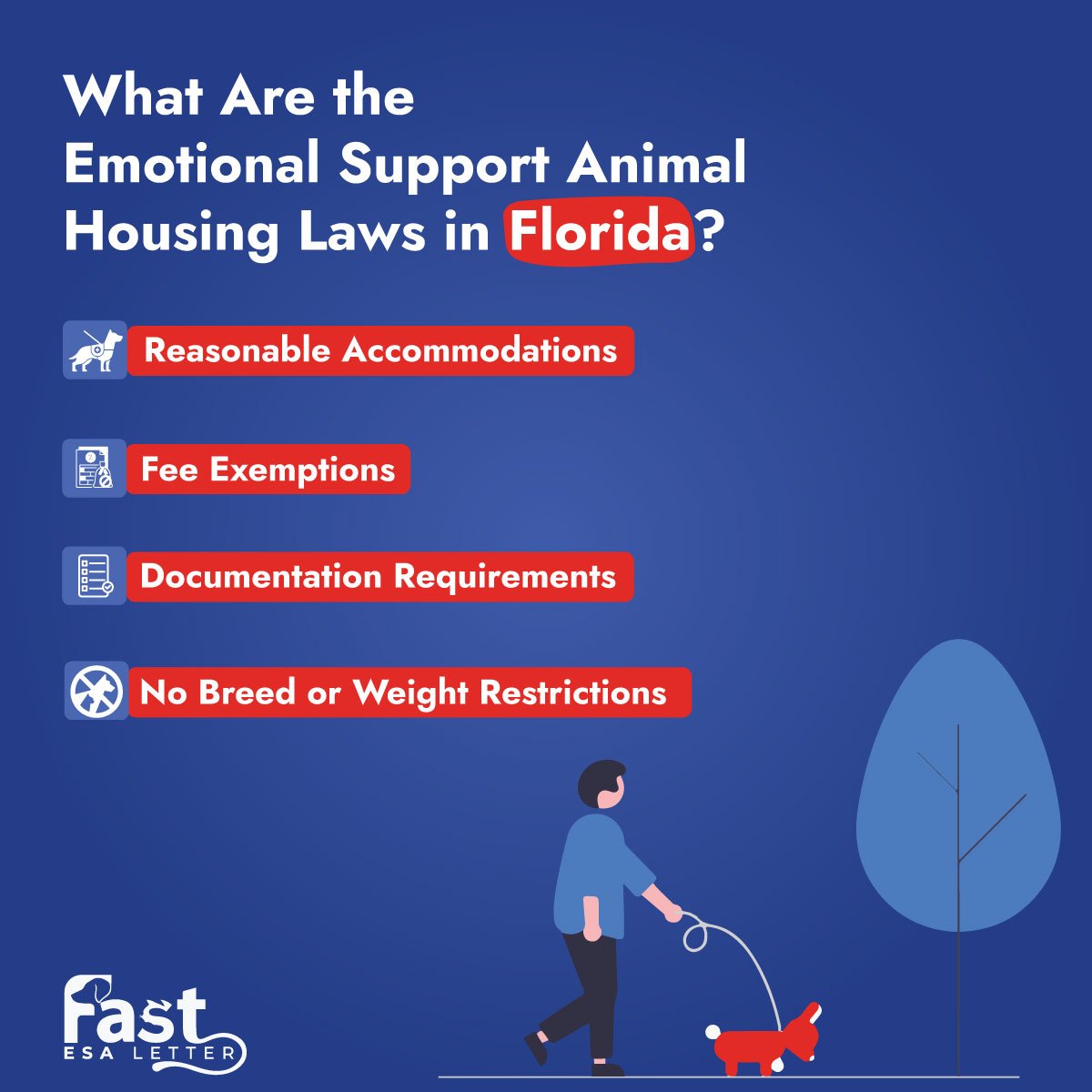What Are the Emotional Support Animal (ESA) Laws in Florida?


What Are the Emotional Support Animal Housing Laws in Florida?
In Florida, emotional support animals are protected under state and federal laws, specifically the Fair Housing Act (FHA). These laws ensure that individuals with mental or emotional health needs can live with their ESAs, even in housing with “no-pets policies.” Landlords and housing providers must adhere to the following:

- Reasonable Accommodations: Under Florida ESA laws, landlords are required to make reasonable accommodations for tenants with valid ESA documentation, allowing them to keep their ESAs in rental properties. Refusing such accommodations constitutes a violation of the Fair Housing Act.
- Fee Exemptions: Housing providers cannot charge pet-related fees or higher rent for individuals with ESAs. However, if the ESA causes property damage, tenants may be held responsible for the cost of repairs.
- Documentation Requirements: Landlords may request an ESA letter from a licensed mental health professional, confirming the individual’s need for the animal to manage a disability. They cannot ask for detailed medical information.
- No Breed or Weight Restrictions: Florida state laws on emotional support animals prohibit landlords from imposing restrictions based on breed, size, or weight. However, they can deny accommodation if the animal poses a direct threat or causes significant disruption.
Florida emotional support animal housing laws aim to protect renters’ rights and ensure equal opportunities in housing for individuals with disabilities.
What Florida ESA Laws Apply to Work Environments?
Access to workplaces for emotional support animals in Florida depends on employer policies and the circumstances of the employee requesting accommodation.
- Florida employees may request workplace accommodations for their ESA by providing a valid ESA letter. Employers are not obligated to allow ESAs, but accommodations may be granted if the ESA supports the employee’s mental or emotional health.
- Each company has unique policies on animals in the workplace. Familiarizing yourself with Florida workplace regulations for ESAs will help in making your case.
- Employers can deny requests if the ESA poses a safety risk, disrupts workflow, or creates undue hardship for the company.
What Are the ESA Laws for Travel in Florida?
- Air Travel: Recent updates to the Air Carrier Access Act (ACAA) mean airlines are no longer required to accommodate ESAs. Most airlines, including those operating in Florida, classify ESAs as pets, and may charge fees or require ESAs to travel in carriers. It is essential to check your chosen airline’s policy ahead of time.
- Public Transit: Florida public transportation systems, such as buses, trains, and commuter rails, are not obligated to allow ESAs. Unlike service animals protected under the ADA, ESAs must adhere to the transit provider’s pet policies. Be sure to check with local transit authorities.
- Rideshares and Taxis: Companies like Uber and Lyft are not required to allow ESAs in Florida, though service animals are protected by law. Drivers have the discretion to permit ESAs in their vehicles. To avoid inconvenience, it’s recommended to notify the driver or check directly with the service provider when booking.
What Are Public Access Laws for ESA in Florida?
Public access laws for emotional support animals in Florida differ significantly from those for service animals under the Americans with Disabilities Act (ADA). This means Florida ESA laws do not guarantee public access rights for emotional support animals in venues such as hotels, restaurants, or stores. However, many pet-friendly places in Florida may allow ESAs. Therefore, it is advisable to contact the establishment in advance.
Pet-Friendly Places in Florida Where You Can Bring Your Emotional Support Animal:
- Gaspar’s Grotto, Tampa: This Ybor City restaurant welcomes well-behaved dogs on its patio, offering a lively atmosphere for you and your ESA.
- Lake Baldwin Park, Winter Park: A 23-acre lakeside park where dogs can run off-leash during designated hours, featuring a beach, picnic areas, and a boat ramp.
- Fort De Soto Park, Tierra Verde: Renowned for its dog-friendly beach and Paw Playground, allowing dogs to swim and play off-leash in designated areas.
- Bonita Beach Dog Beach, Bonita Springs: An off-leash beach near the Fort Myers/Bonita Springs line where dogs can enjoy the Gulf waters freely.
- Pizza Rustica, Delray Beach: This eatery permits pets to join their owners in the sidewalk seating area, offering a pet-friendly dining experience.

What to Do If Your Landlord Refuses Your ESA in Florida?
Are Emotional Support Animals Allowed in Florida Schools or Colleges?
Florida ESA laws do not grant automatic access to ESAs in schools. However, different institutions have specific policies:
- Colleges & Universities: Under ESA laws in Florida, some colleges allow ESAs in on-campus housing as part of Florida housing law emotional support animals protections. You need a valid ESA letter from a licensed mental health professional and should consult the school’s disability office for their specific process.
- K-12 Schools: Florida state laws on emotional support animals do not require public schools to accept ESAs, except for trained service animals. However, parents can request accommodations if an ESA is crucial for their child’s well-being.
How to Get a Legitimate ESA Letter in Florida?
To comply with emotional support animal Florida housing regulations, follow these steps:
- Consult a Licensed Professional: Schedule an appointment with a mental health expert familiar with Florida ESA laws.
- Discuss Your Needs: Explain how an ESA supports your mental health.
- Obtain a Valid ESA Letter: If approved, your licensed provider will issue a Florida ESA letter that aligns with emotional support animal Florida rental laws.
Conclusion
Frequently Asked Questions
Do Florida Landlords Have To Accept Emotional Support Animals?
Can A Landlord Ask For Proof Of My Emotional Support Animal In Florida?
Are Emotional Support Animals Allowed In Hotels In Florida?
No, under the emotional support animal laws Florida hotels are not obligated to accept ESAs. However, many pet-friendly hotels may accommodate ESAs. It is recommended to check the hotel’s policy in advance.
What Happens If I Falsely Claim My Pet As An ESA In Florida?
Post Author
Prince Sharma
Related Articles
What Are Emotional Support Animal Laws in Wisconsin?
What Are Emotional Support Animal Laws in Wisconsin?In Wisconsin, emotional support animals are protected under the Fair Housing Act, which requires landlords to make reasonable accommodations for tenants with ESAs, even in no-pet housing. Medically...
What Are Emotional Support Animal Laws in Arkansas?
What Are Emotional Support Animal Laws in Arkansas?Arkansas residents with emotional support animals are covered by federal housing protections. With proper documentation, landlords cannot charge extra pet fees or deny housing. Medically Reviewed by...
What Are the Emotional Support Animal Laws in Oregon?
What Are the Emotional Support Animal (ESA) Laws in Oregon?In Oregon, emotional support animals are protected under the Fair Housing Act, which requires landlords to make reasonable accommodations for tenants with ESAs, even in no-pet housing....
Live Free with Your ESA!
An ESA Letter Unlocks Freedom!






